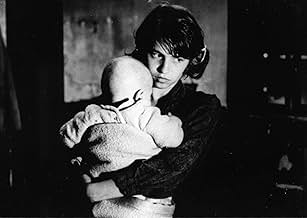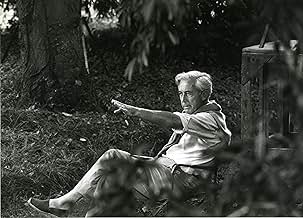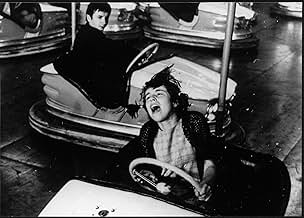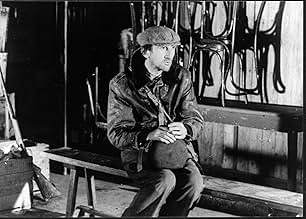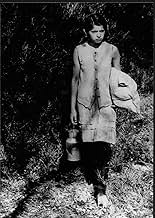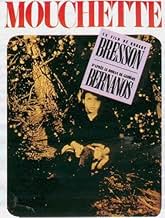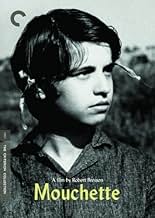AVALIAÇÃO DA IMDb
7,7/10
14 mil
SUA AVALIAÇÃO
Uma jovem mulher que vive no campo francês sofre humilhações constantes às mãos do alcoolismo e de seus semelhantes.Uma jovem mulher que vive no campo francês sofre humilhações constantes às mãos do alcoolismo e de seus semelhantes.Uma jovem mulher que vive no campo francês sofre humilhações constantes às mãos do alcoolismo e de seus semelhantes.
- Direção
- Roteiristas
- Artistas
- Prêmios
- 5 vitórias e 1 indicação no total
- Direção
- Roteiristas
- Elenco e equipe completos
- Produção, bilheteria e muito mais no IMDbPro
Avaliações em destaque
10mflamman
Sublime film from Robert Bresson!
Actually it was my first encounter with Bresson's work, five or six weeks ago. I was so eager to see it...Bresson's films ("Mouchette" and "Au hasard Balthazar") haven't disappointed me- to see the least!
"Mouchette" is such a pure film, so sublime. So powerful. When I saw this film, it really blew me away totally. So overwhelming. But now, weeks after that experience (I saw that films more than once, btw) it's still beginning to gain more power and emotion.
"Mouchette" has such overwhelming, graceful, brilliant images, shots and scenes. The opening scene may be the best ever: brilliant and pure, it tells everything you will see in the next hour and twenty minutes. The use of the music, sublime sounds of Monteverdi, is unique, powerful and brilliant. No more than- what is it?- ten seconds or so it can be heard. The opening scene is so short...
That's the power of Bresson: images, sounds, scenes are presented in such a brilliant way. When we are beginning to be attached to them, other images and shots are already presented. As a viewer, you can't really be attached totally by them. That's way these images, shots, scenes will be in your mind long after the film: all things, all scenes and situations, and especially all emotions (if they are shown at all) are shown in actually too short a time, that you, as a viewer, will be forced to "finish" them. You are forced to locate the emotions not shown, to locate the situations and details which are only suggestively shown. Bresson's editing is just brilliant, bt it may take some time before you are aware of that.
Some of the most brilliant scenes ever are presented here: Mouchette, forced to go into church by her father; Mouchette's brilliantly and superbly simple introduction to the viewer. Most notable for me, besides the ending scene of course, is the scene with Mouchette in the dodgem cars, having her only small feelings of joy and relieve. The expressions and emotions shown in this really magnificent scene, maybe the best and most emotional I've ever witnessed, are to diverse to even describe them. Just watch this scene...
Nadine Nortier, playing Mouchette, blew me away with her magnificent acting. So pure, sublime, graceful and heartfelt. One of the most striking peaces of "acting" I've ever seen...!
This superb film will be in my mind for ever, just like "Au hasard Balthazar". Nobody, not even the best like Dreyer, Ozu, Bergman and Tarkovsky, can present stories, images and "emotions" in such a superbly simple, transcendental and pure way as Bresson.
Masterpiece!
Actually it was my first encounter with Bresson's work, five or six weeks ago. I was so eager to see it...Bresson's films ("Mouchette" and "Au hasard Balthazar") haven't disappointed me- to see the least!
"Mouchette" is such a pure film, so sublime. So powerful. When I saw this film, it really blew me away totally. So overwhelming. But now, weeks after that experience (I saw that films more than once, btw) it's still beginning to gain more power and emotion.
"Mouchette" has such overwhelming, graceful, brilliant images, shots and scenes. The opening scene may be the best ever: brilliant and pure, it tells everything you will see in the next hour and twenty minutes. The use of the music, sublime sounds of Monteverdi, is unique, powerful and brilliant. No more than- what is it?- ten seconds or so it can be heard. The opening scene is so short...
That's the power of Bresson: images, sounds, scenes are presented in such a brilliant way. When we are beginning to be attached to them, other images and shots are already presented. As a viewer, you can't really be attached totally by them. That's way these images, shots, scenes will be in your mind long after the film: all things, all scenes and situations, and especially all emotions (if they are shown at all) are shown in actually too short a time, that you, as a viewer, will be forced to "finish" them. You are forced to locate the emotions not shown, to locate the situations and details which are only suggestively shown. Bresson's editing is just brilliant, bt it may take some time before you are aware of that.
Some of the most brilliant scenes ever are presented here: Mouchette, forced to go into church by her father; Mouchette's brilliantly and superbly simple introduction to the viewer. Most notable for me, besides the ending scene of course, is the scene with Mouchette in the dodgem cars, having her only small feelings of joy and relieve. The expressions and emotions shown in this really magnificent scene, maybe the best and most emotional I've ever witnessed, are to diverse to even describe them. Just watch this scene...
Nadine Nortier, playing Mouchette, blew me away with her magnificent acting. So pure, sublime, graceful and heartfelt. One of the most striking peaces of "acting" I've ever seen...!
This superb film will be in my mind for ever, just like "Au hasard Balthazar". Nobody, not even the best like Dreyer, Ozu, Bergman and Tarkovsky, can present stories, images and "emotions" in such a superbly simple, transcendental and pure way as Bresson.
Masterpiece!
Until now Robert Bresson has been one of those classic directors who have failed to connect with me. With Au Hasard Balthazar and Pickpocket, I've found his style over-simplified, bland and plodding. While Balthazar didn't work for me at all, Pickpocket had moments where it showed potential but then it was quickly squandered and taken in a different direction. Here with Mouchette, his style is finally working. It's a film utterly drenched in sorrow and pain. Through the protagonists' squirming and rebelling from her struggles, her actions are a catharsis from the frustrations of life and when she's punished for them, it digs deep. Although the storytelling techniques are similar to the films I didn't care much for, what elevates Mouchette is the passionate performances and the crisp photography. While I do regret that it's so brief, Mouchette is a brilliant portrayal of a truly tragic figure that faces the hardships and inevitable moral dilemmas of life. I'm very glad Bresson has warmed up to me as he's got many films I'm really looking forward to, such as A Man Escaped and Lancelot du Lac.
8/10
8/10
Among the best things that can happen to me as a viewer is to watch a filmmaker grow into mastery, and I've just gone through a series of viewing where Bresson grew before my eyes. He wasn't a master before Balthazar in my estimation but he was one now.
See, he had started with ambitious work in Diary of a Priest, but something must have troubled him, the spiritual search was coming off as emotional anguish, resulting in sentimentality. His next three were all about finding ways to quell this, fasting the eye, muting the emotion.
This is all the more reason to celebrate him, because it could have gone either way. He could have turned out film after film where he mutes expression and turns actors into bare stumps and called it pure. But if this was purity, where was the life in which the pure is woven through? Bresson matters I believe because he left the stone floor of his ascetic phase to grow into this, his sculpting phase.
This is a sculpture of moving image and sound, even more so than Balthazar, even more purely about the rooms and spaces in which a young girl faces the duplicity of life. It's all in how he chisels the air with the camera, he does this in three parts.
The day before, with its moments of small everyday cruelty and unexpected kindness alike. She has a beautiful voice but won't sing with her classmates until forced, a passing woman unexpectedly gives her money for the bumping cars, but her dalliance with a boy is cut short and she has to go sit with her father. It's heart-aching because all she needs is someone to mind her and no one does outside of making her behave how they want to, most of us have been savaged this way as kids.
The night of unfathomable emotions out in the woods, and look how masterfully. Why she does what she does in the cabin, why she swears to protect his secret and professes love, perhaps intuitively protecting herself, perhaps asserting herself against authority, this is all as unfathomable as why the man goes back out to commit violence. It's all in that shot where the two men laugh, for no reason other than all this being absurd, beneath a dark sky, and the wind that blows all through the night.
In the third part of the film we have the day after, with this complicated human nature brought to the stark light of what other people think. Bresson shows us judgment and cynicism, and even the old woman's advice about death is waved off; too musty for a young girl, more advice.
So how poignant to see this shift in Bresson? He gives us by the end a more eloquent Jeanne D'arc, now the dogmatist interrogators become your small-minded neighbors and Joan is neither pure nor certain in any way about the truth of what she experienced. No ceremonial death. And how deep it cuts, that she may have wanted to ask her mother for advice, unburden the confusion, but has to go through it alone.
So after a series of Bresson viewings, I will come to rest here. Antonioni would take home the Palm that year but Bresson had conquered his obstacles and arrived fully. The title of Tarkovsky's book best describes what he does here, and you can see the Tati influence as a new tool that he didn't have back in Pickpocket. He sculpts an external time, but now in such a way that the pure is found where it grows roots and rustles, among life.
It would be Tarkovsky's turn now to shoulder this legacy, and Dreyer's, asking himself, what kind of time? We dream and yearn with an asymmetric logic and mingle with our reflection. It would be one of the great leaps in the cinema but for that we'd have to go forward.
See, he had started with ambitious work in Diary of a Priest, but something must have troubled him, the spiritual search was coming off as emotional anguish, resulting in sentimentality. His next three were all about finding ways to quell this, fasting the eye, muting the emotion.
This is all the more reason to celebrate him, because it could have gone either way. He could have turned out film after film where he mutes expression and turns actors into bare stumps and called it pure. But if this was purity, where was the life in which the pure is woven through? Bresson matters I believe because he left the stone floor of his ascetic phase to grow into this, his sculpting phase.
This is a sculpture of moving image and sound, even more so than Balthazar, even more purely about the rooms and spaces in which a young girl faces the duplicity of life. It's all in how he chisels the air with the camera, he does this in three parts.
The day before, with its moments of small everyday cruelty and unexpected kindness alike. She has a beautiful voice but won't sing with her classmates until forced, a passing woman unexpectedly gives her money for the bumping cars, but her dalliance with a boy is cut short and she has to go sit with her father. It's heart-aching because all she needs is someone to mind her and no one does outside of making her behave how they want to, most of us have been savaged this way as kids.
The night of unfathomable emotions out in the woods, and look how masterfully. Why she does what she does in the cabin, why she swears to protect his secret and professes love, perhaps intuitively protecting herself, perhaps asserting herself against authority, this is all as unfathomable as why the man goes back out to commit violence. It's all in that shot where the two men laugh, for no reason other than all this being absurd, beneath a dark sky, and the wind that blows all through the night.
In the third part of the film we have the day after, with this complicated human nature brought to the stark light of what other people think. Bresson shows us judgment and cynicism, and even the old woman's advice about death is waved off; too musty for a young girl, more advice.
So how poignant to see this shift in Bresson? He gives us by the end a more eloquent Jeanne D'arc, now the dogmatist interrogators become your small-minded neighbors and Joan is neither pure nor certain in any way about the truth of what she experienced. No ceremonial death. And how deep it cuts, that she may have wanted to ask her mother for advice, unburden the confusion, but has to go through it alone.
So after a series of Bresson viewings, I will come to rest here. Antonioni would take home the Palm that year but Bresson had conquered his obstacles and arrived fully. The title of Tarkovsky's book best describes what he does here, and you can see the Tati influence as a new tool that he didn't have back in Pickpocket. He sculpts an external time, but now in such a way that the pure is found where it grows roots and rustles, among life.
It would be Tarkovsky's turn now to shoulder this legacy, and Dreyer's, asking himself, what kind of time? We dream and yearn with an asymmetric logic and mingle with our reflection. It would be one of the great leaps in the cinema but for that we'd have to go forward.
It seems entirely appropriate that the film opens with the metaphor of birds being snared as this seems to apply not only to Mouchette's life, but to Bresson's approach to the viewer as well.
For what, after all, is the director attempting to do here? Are we really to regard this as an unblinking gaze into the life of an abused, outcast girl? If so, why is Bresson so intent on excluding even the most fleeting moments of joy (or at least humor) that enter even the darkest of lives (I believe a philosopher once said "alas, joy too must have its day")? It is pretty telling that the one scene involving happiness for Mouchette is the most monotonous and lifeless in the picture (the bumper cars). Not only are we not allowed to experience her joy, but Bresson is careful to distance us from the real experience of her pain as well. This is done by the use of "gestures" (particularly prominent in Bresson's later films) that "signify" a character's experience rather than giving us the person's individualized emotional and visceral reactions to events. Thus the assault on Mouchette is shown in a distant, almost pantomimed manner, her relationship with her father is suggested by dropping coins in his hand, a disembodied hand slapping her face, etc. So, are we really to identify with Mouchette, to feel her pain, seeing how her experience of life intersects with our own in only the most symbolic, muted fashion? Is this really "compassion" and is this really Bresson's purpose?
Or is Mouchette a figure that Bresson uses (and dehumanizes), as literally every character in the movie uses her, to achieve other purposes? In this case the selling of a particular view of the world. One which sees the world as a snare, both in its joy and its pain, that is "saved" only by the (symbolic) suffering of the innocent, and transcended/transformed only by death. In other words a viewpoint that that advocates looking beyond (or turning away from)life to find "transcendent" truths. A view based on judgement rather than acceptance. And if this is "the truth" why must so much of what we experience as truth (such as joy, intimacy, occasional feelings of "oneness" with the world) be so forcibly excluded? Are these all really illusions, the world simply a snare? And without acceptance of ALL of Mouchette's reality can she,or any of us, really be redeemed?
Yes, Bresson is a meticulous, incisive, and occasionally powerful filmaker. But is he really honest? Are there some TRUTHS that he can't face (and so desperately restricts his view). In MOUCHETTE we are a little more aware of the puppeteer's strings than usual. 7 out of 10.
For what, after all, is the director attempting to do here? Are we really to regard this as an unblinking gaze into the life of an abused, outcast girl? If so, why is Bresson so intent on excluding even the most fleeting moments of joy (or at least humor) that enter even the darkest of lives (I believe a philosopher once said "alas, joy too must have its day")? It is pretty telling that the one scene involving happiness for Mouchette is the most monotonous and lifeless in the picture (the bumper cars). Not only are we not allowed to experience her joy, but Bresson is careful to distance us from the real experience of her pain as well. This is done by the use of "gestures" (particularly prominent in Bresson's later films) that "signify" a character's experience rather than giving us the person's individualized emotional and visceral reactions to events. Thus the assault on Mouchette is shown in a distant, almost pantomimed manner, her relationship with her father is suggested by dropping coins in his hand, a disembodied hand slapping her face, etc. So, are we really to identify with Mouchette, to feel her pain, seeing how her experience of life intersects with our own in only the most symbolic, muted fashion? Is this really "compassion" and is this really Bresson's purpose?
Or is Mouchette a figure that Bresson uses (and dehumanizes), as literally every character in the movie uses her, to achieve other purposes? In this case the selling of a particular view of the world. One which sees the world as a snare, both in its joy and its pain, that is "saved" only by the (symbolic) suffering of the innocent, and transcended/transformed only by death. In other words a viewpoint that that advocates looking beyond (or turning away from)life to find "transcendent" truths. A view based on judgement rather than acceptance. And if this is "the truth" why must so much of what we experience as truth (such as joy, intimacy, occasional feelings of "oneness" with the world) be so forcibly excluded? Are these all really illusions, the world simply a snare? And without acceptance of ALL of Mouchette's reality can she,or any of us, really be redeemed?
Yes, Bresson is a meticulous, incisive, and occasionally powerful filmaker. But is he really honest? Are there some TRUTHS that he can't face (and so desperately restricts his view). In MOUCHETTE we are a little more aware of the puppeteer's strings than usual. 7 out of 10.
Just like I remembered. The face of Nadine Nortier has not changed. The unbelievable "Mouchette" in this unforgettable Robert Bresson masterpiece. I hadn't seen the film since I was a teen ager. I saw it again last night and as if by magic it felt more contemporary today than it did then and then, let me tell you, it felt pretty real in its own rigorous lyrical style. What a shockingly wonderful effect a film like this could have on teen agers today. To stay with a character who takes us with nothing more than her naked truth through a landscape of absolute desolation. Her innocence intact, in spite of the outrage. Her ultimate act as breathtaking as anything we have ever seen on the screen, before or since. I tried to show the film to a group of twentysomethings, all of them walked away within the first fifteen minutes. All except one, a boy of 21, he had escaped Bosnia with his brother a few short years ago. As the film ended I looked at him. He was silent. He spoke without looking at me "can I see it again?" That's at the center of the experience that provides this film. "Mouchette" is meant for everyone, but it'll touch only some.
Você sabia?
- CuriosidadesIt was rumored for years that the trailer for this film was by Jean-Luc Godard, and he has recently confirmed this by programming it in a self-curated retrospective of his work. The trailer is virtually a miniature essay on (or subversion of) the film, jarringly inter-cutting excerpts from it with a written commentary that calls it "Christian and sadistic."
- Erros de gravação(at around 1 min) The canteen changes position after being dropped.
- ConexõesEdited into Bande-annonce de 'Mouchette' (1967)
- Trilhas sonorasMagnificat
Written by Claudio Monteverdi
Performed by Les Chanteurs de St. Eustache
Conducted by R.P. Émile Martin
Principais escolhas
Faça login para avaliar e ver a lista de recomendações personalizadas
- How long is Mouchette?Fornecido pela Alexa
Detalhes
- Tempo de duração
- 1 h 21 min(81 min)
- Cor
- Mixagem de som
- Proporção
- 1.66 : 1
Contribua para esta página
Sugerir uma alteração ou adicionar conteúdo ausente

